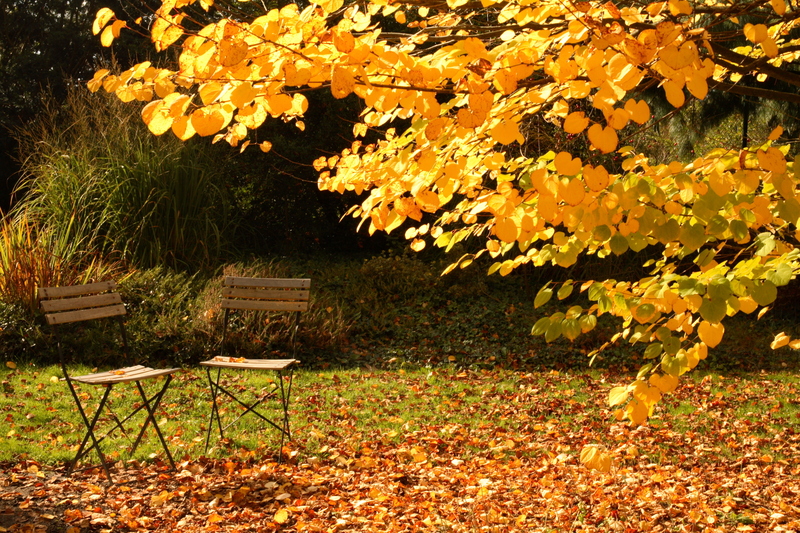Creating a Vibrant Outdoor Garden for Children
Posted on 29/06/2025
Creating a Vibrant Outdoor Garden for Children
Embarking on the journey of creating a vibrant outdoor garden for children opens a world of discovery, learning, and unbridled joy! Gardens are more than just beautiful spaces; especially designed children's gardens can become interactive classrooms, places of exploration, and playgrounds teeming with life. Whether you have a spacious backyard or a cozy urban plot, designing a child-friendly garden is a rewarding way to spark curiosity in young minds and nurture a lifelong love for nature.
Why Design a Child-Friendly Garden?
A child-friendly outdoor garden does more than just beautify your landscape. It serves as a dynamic, safe, and engaging space that encourages physical activity, develops motor skills, fosters creativity, and builds environmental awareness. Children's gardens introduce kids to fresh air and sunlight and improve their overall well-being through unstructured play and exploration.
Top Benefits of a Children's Garden
- Physical Development: Digging, planting, weeding, and harvesting boost fine and gross motor skills.
- Mental Well-Being: Outdoor play has been linked to reduced stress and anxiety in children.
- Educational Growth: Gardening teaches responsibility, patience, and introduces scientific concepts.
- Connection to Nature: Early exposure nurtures a sense of stewardship and respect for the environment.
- Family Bonding: Gardening can become a shared family activity, promoting teamwork and healthy habits.

Essential Elements for a Vibrant Garden for Kids
When creating a colorful children's outdoor garden, certain features will help maximize safety, appeal, and hands-on engagement. Consider these foundational elements as you plan your garden:
1. Safe and Accessible Layout
- Clear Paths: Wide, obstacle-free paths allow easy movement for little feet and wheelchairs or strollers if necessary.
- Soft Surfaces: Use mulch, grass, or rubber mats to cushion falls and create a child-safe play environment.
- Raised Beds: Elevated planting areas are visually exciting and make gardening more accessible for all ages.
2. Sensory-Rich Environments
- Colorful Blooms: Plant flowers in a variety of colors and shapes to stimulate visual interest.
- Fragrant Plants: Include herbs like mint, lavender, and chocolate cosmos for smelling, touching, and tasting.
- Tactile Surfaces: Encourage exploration with plants like lamb's ear (soft) or ornamental grasses (wispy).
- Sound Elements: Add wind chimes, rustling bamboo, or plants like seed pods for natural music.
3. Spaces for Play and Exploration
- Mini Trails: Create winding pathways or stepping stones to discover hidden nooks.
- Secret Hides: Willow tunnels, teepees made of sunflowers, or beanpole tents give children imaginative spaces to play.
- Butterfly Gardens: Growing nectar-rich flowers attracts butterflies, teaching children about pollinator lifecycles.
- Bug Hotels & Birdhouses: Support local wildlife while giving kids a close look at nature's tiny creatures.
4. Interactive Edible Garden Zones
- Vegetable Patches: Let kids grow easy crops like snap peas, cherry tomatoes, radishes, or lettuce--fun to plant and tasty to eat!
- Berry Bushes: Strawberries, raspberries, and blueberries are delicious incentives for garden care.
- Herb Spirals: Mix scents and flavors while learning about culinary uses.
Steps to Design a Vibrant Outdoor Children's Garden
Building a vibrant outdoor garden for children is a joyful process that can be tailored to fit your location, budget, and interests. Follow these steps for a meaningful transformation:
Step 1: Involve Children in the Planning
- Gather Ideas: Sit down with your kids and brainstorm their dream garden. What do they want to see, smell, touch, taste, or do?
- Create a Wish List: Let them draw pictures or create a mood board with magazine cutouts.
Step 2: Assess Your Space
- Sun and Shade: Identify areas that get full sun versus shade; this determines what you can grow and where activity zones can be set up.
- Size & Shape: Measure your space and sketch a basic layout.
- Soil Quality: Test your soil and amend with compost for a fertile and safe growing environment.
Step 3: Design and Divide the Zones
- Active Play Areas: Set aside space for running, climbing, or balancing.
- Quiet Nooks: Carve out corners for reading, drawing, or simply watching nature.
- Planting Beds: Designate areas for growing flowers, herbs, or vegetables--use colorful markers or child-made signs.
Step 4: Select Child-Friendly Plants
Choose plants that are safe, non-toxic, resilient, and varied in shape, color, and use. Avoid anything prickly, poisonous, or requiring high maintenance.
- Sunflowers: Tall, fast-growing, and fun to watch turn toward the sun.
- Snapdragons: Vibrant blooms that children can gently "snap" open.
- Marigolds: Hardy, bright and often repel pests.
- Pumpkins or Gourds: Great for autumn harvests and craft projects.
- Basil, Mint, Chives: Edible and aromatic; helps introduce kids to cooking.
- Strawberries: Sweet, low-maintenance, and reward gardeners with juicy fruit.
Step 5: Add Features for Sensory and Creative Play
- Mud Kitchen: Repurpose old utensils and wooden pallets for a DIY outdoor "kitchen."
- Stepping Stones: Painted stones or discs add color and become a hopscotch path.
- Sand or Water Table: Encourage sensory play with materials for digging, pouring, and sculpting.
- Garden Art: Hang wind spinners, flags, or let children create painted plant markers.
Year-Round Activities in a Children's Garden
Keep children engaged by planning activities for every season. A vibrant garden for kids isn't just about planting, but about experiencing the outdoors together all year.
- Spring: Sow seeds, start a nature journal, look for emerging insects and birds.
- Summer: Water with child-safe sprinklers, harvest veggies, press flowers, camp out under the stars.
- Autumn: Collect leaves and pinecones for crafts, harvest pumpkins, compost fallen foliage.
- Winter: Feed the birds, build bug habitats, explore frosty textures, and plant bulbs for the next year.
Tips for Encouraging Child Involvement in the Garden
- Empower Ownership: Give children their own patch or pots to plant what they desire.
- Use Child-Sized Tools: Lightweight shovels, rakes, and gloves encourage independence and safety.
- Celebrate Success: Mark growth milestones or produce harvests with a mini "harvest festival."
- Embrace Mess: Remember: Dirt washes off--wonder and curiosity last a lifetime!
Safety Guidelines for Vibrant Children's Outdoor Gardens
While fun and freedom are key, safety comes first when designing your kid-friendly outdoor garden:
- Avoid Toxic Plants: Before planting, research each plant for safety--common culprits include daffodils, azaleas, and foxglove.
- Secure Boundaries: Use fencing or low hedges to define the garden area and keep children away from streets or hazards.
- Safe Tools: Choose non-sharp, age-appropriate gardening tools and teach their proper use.
- Non-Chemical Care: Opt for organic fertilizers and pest controls, avoiding harsh chemicals and sprays.
- Supervise Water Features: If you include a pond, fountain, or birdbath, ensure it's shallow and covered or supervised.
Inspiring Garden Themes for Kids
Choosing a theme can provide structure and inspiration for your children's outdoor garden. Here are a few fun ideas:
- Fairy Tale Garden: Plant whimsical flowers, install tiny fairy houses, and create magical paths using sparkly pebbles.
- Wildlife Sanctuary: Focus on flowers that attract pollinators, install bug hotels, and add a bird feeder or nesting box.
- Peter Rabbit's Patch: Grow carrots, lettuce, radishes, and clue in little bunnies looking for a snack!
- Rainbow Garden: Arrange flowerbeds by color bands--red poppies, orange calendula, yellow sunflowers, green herbs, blue cornflowers, indigo salvias, and violet pansies.
- Musical Garden: Incorporate bamboo canes, wind chimes, and resonance stones, alongside plants that rustle or shake.

Common Questions About Creating a Kids' Garden
How Much Space Do I Need?
You can create a vibrant outdoor garden for children on any scale! Use small raised beds, container gardens, or even windowsill trays if space is tight. The key is interactivity and accessibility--not size.
What If I Don't Have a Yard?
Many of the principles for outdoor children's gardens apply to balconies, patios, and even rooftop spaces. Utilize vertical planters, railing boxes, and movable pots to maximize potential.
How Can I Get Kids Interested?
Let them take the lead! Involving children in all phases--from design and plant selection to daily care and harvest--fuels genuine enthusiasm and pride in their living creation.
Conclusion: The Lasting Value of a Vibrant Outdoor Children's Garden
Creating a vibrant outdoor garden for children is a beautiful investment in your child's physical, emotional, and intellectual growth. With careful planning, child-safe features, and space for creativity and exploration, you'll provide a playful, nurturing environment where kids can dig, discover, and delight in the wonders of the natural world. So, roll up your sleeves, gather your little helpers, and plant the seeds of a greener, happier future--one vibrant children's garden at a time!
Start Your Family Garden Adventure Today!
With the right mix of fun, learning, and nature, your children's outdoor garden will become a cherished place of growth and memory-making for seasons to come. Happy planting!
Latest Posts
Turning Soil into a Climate Change Ally with Gardening
Gardening Made Easy: Dive into the World of Containers
Step-by-Step Guide to Building the Best Garden Seating Areas

